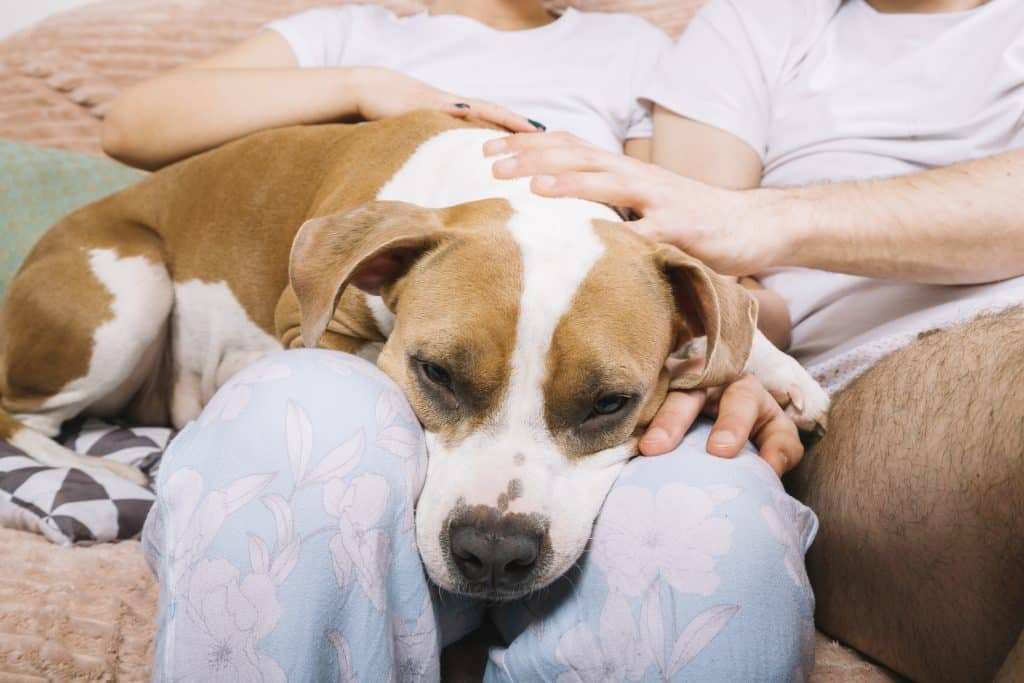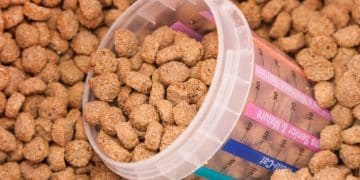Pet gut health and mood: New 2025 research reveals connection

Anúncios
Emerging research in 2025 highlights a strong link between pet gut health and mood, showing that a balanced digestive system is key to emotional well-being.
Understanding this connection helps explain changes in behavior, anxiety, and overall happiness. Many behavioral issues in pets, like irritability or anxiety, may stem from digestive imbalances.
Focusing on pet gut health and mood provides actionable strategies to support both physical and emotional wellness for your furry companions.
Anúncios
The gut-brain axis: A deeper dive into pet physiology in 2025
The concept of the gut-brain axis is not entirely new in human medicine, but its profound implications for companion animals are only now being rigorously investigated in 2025.
This complex bidirectional communication links the central nervous system with the enteric nervous system within the gastrointestinal tract.
Brain influences gut function, and critically, the gut influences brain function, including pet gut health and mood.
Anúncios
For pets, trillions of microorganisms in their digestive system, the gut microbiome, do more than aid digestion. They produce neuroactive compounds, alter immune responses, and send direct signals to the brain.
This interplay forms the foundation of the “second brain” in both humans and animals. Understanding this axis is vital for unlocking holistic strategies for pet gut health and mood.
Microbiome composition and its influence
A diverse and balanced gut microbiome is critical. Healthy guts contain beneficial bacteria that work synergistically. Disruption, called dysbiosis, can affect more than digestion.
Recent studies in 2025 link certain bacterial strains to anxiety, aggression, and cognitive decline in pets, demonstrating the direct impact of pet gut health and mood.
- Beneficial bacteria: Lactobacillus and Bifidobacterium produce short-chain fatty acids (SCFAs) with anti-inflammatory effects that cross the blood-brain barrier.
- Pathogenic overgrowth: Harmful bacteria can trigger chronic inflammation, nutrient malabsorption, and toxins that impair brain chemistry.
Neurotransmitter production in the gut
Astonishingly, the gut produces neurotransmitters like serotonin, the “happiness hormone” and dopamine precursors.
A compromised gut can disrupt these mood-regulating compounds, affecting behavior. The gut also influences GABA production, critical for calming the nervous system.
Imbalances here directly impact pet gut health and mood, showing why digestive wellness is crucial alongside behavioral interventions.

Recognizing the signs: Is your pet’s behavior linked to gut issues?
Behavioral observation is the first step in identifying gut-related issues. Gastrointestinal symptoms like diarrhea or constipation are obvious, but behavioral signs, anxiety, irritability, lethargy, can be subtle.
2025 research emphasizes that many behavioral problems often stem from pet gut health and mood, rather than personality alone.
Common behavioral indicators of gut imbalance
- Increased anxiety or fear: Excessive panting, pacing, hiding, destructive chewing, or inappropriate elimination.
- Aggression or reactivity: Snapping, growling, lunging, or low tolerance for touch or interaction.
- Lethargy or depression: Reduced playfulness, loss of interest, excessive sleeping, withdrawal.
- Obsessive-compulsive behaviors: Constant licking of paws, tail chasing, or repetitive pacing.
Even mild digestive upsets can affect mood. Dysbiosis-induced inflammation can translate to chronic stress, affecting neurological and emotional resilience, directly linking pet gut health and mood.
Impact of chronic inflammation
Chronic low-grade inflammation connects gut health to mood. A compromised gut barrier allows toxins into the bloodstream, triggering systemic inflammation that can affect the brain.
Neuroinflammation has been linked to various neurological conditions, and, 2025 studies in pets mirror these findings.
Managing gut inflammation improves both digestive and mental health, reinforcing the importance of pet gut health and mood.
Dietary interventions: Fueling a happy gut and mind in 2025
The gut microbiome directly influences mood. A carefully designed diet optimizes gut diversity, enhancing mental clarity and reducing anxiety.
Prioritizing whole, minimally processed foods supports pet gut health and mood, emphasizing high-quality proteins, complex carbohydrates, fiber, and healthy fats.
- Quality protein sources: Lean meats and novel proteins for sensitive pets.
- Complex carbohydrates & fiber: Sweet potatoes, pumpkin, or grains (if tolerated).
- Healthy fats: Omega-3 fatty acids from fish oil or flaxseed support anti-inflammatory processes.
Incorporating prebiotics and probiotics
Prebiotics stimulate beneficial bacteria, while probiotics introduce live microorganisms to support the gut.
In 2025, psychobiotics, probiotics supporting mental health, are emerging as a key intervention for pet gut health and mood. Consult a veterinarian for appropriate strains and dosages.
Clean water is essential for digestion. Adequate exercise, mental stimulation, and a stable environment support a healthy gut-brain axis, enhancing pet gut health and mood indirectly.

Stress, environment, and the gut: A pet’s holistic health picture
Diet alone doesn’t dictate mood. Chronic stress and environmental instability can disrupt the gut microbiome.
Signals from stress alter gut motility, permeability, and microbial composition, affecting pet gut health and mood.
The vicious cycle of stress and dysbiosis
Stress triggers “fight or flight,” reducing digestion and beneficial bacteria, amplifying anxiety.
Breaking this cycle through environmental enrichment, consistent routines, and positive reinforcement strengthens pet gut health and mood.
- Environmental Enrichment
- Consistent Routine
- Positive Reinforcement Training
Harnessing behavioral modification and professional support
Combining gut-focused interventions with behavioral techniques enhances results.
Veterinarians, trainers, and behaviorists provide a holistic approach, addressing both pet gut health and mood comprehensively.
Advanced diagnostics and emerging treatments in 2025
Precision diagnostics, microbiome mapping, metabolomics, and fecal microbiota transplantation (FMT) offer personalized solutions for dysbiosis and related behavioral issues, advancing pet gut health and mood care.
Preventative strategies support gut resilience from early life stages.
Proper nutrition, gradual diet transitions, mindful medication use, stress reduction, and regular veterinary care all promote long-term pet gut health and mood.
| Key Point | Brief Description |
|---|---|
| 🔄 Gut-Brain Axis | Complex communication system linking gut health directly to brain function and mood in pets. |
| 🐾 Behavioral Clues | Anxiety, aggression, or lethargy can signal underlying gut imbalances. |
| 🥗 Dietary Impact | Whole foods, prebiotics, and probiotics are key to a balanced gut and improved mood. |
| 🔬 Advanced Care | 2025 offers microbiome mapping and personalized treatments for precise gut health management. |
Frequently Asked Questions (FAQ) about Pet Gut Health and Mood
Yes, increasingly, research shows direct links. Behaviors like increased anxiety, reactivity, aggression, or even lethargy and depression in pets are being correlated with imbalances in their gut microbiome. The gut’s production of neurotransmitters like serotonin and dopamine, and its influence on systemic inflammation, directly impact brain function and, consequently, mood and behavior. Dysbiosis can disrupt these crucial pathways.
Focus on a diet of whole, minimally processed ingredients. Incorporate high-quality proteins, complex carbohydrates, and healthy fats. Crucially, consider adding prebiotics (like fiber from pumpkin or sweet potato) and probiotics to support beneficial gut bacteria. Avoid excessive fillers, artificial additives, and overly processed foods that can disrupt microbial balance. Always transition diets slowly over several days.
Stress, whether acute or chronic, significantly impacts the gut-brain axis. It can alter gut motility, permeability (leading to “leaky gut”), and the balance of beneficial bacteria versus harmful ones. This can create a vicious cycle where gut dysbiosis exacerbates anxiety, making the pet more susceptible to future stress. Reducing environmental stressors and maintaining a consistent routine are vital for gut and mental health.
In 2025, advanced diagnostics include Fecal Microbiota Sequencing (FMS), which provides a detailed map of the gut’s bacterial composition, identifying imbalances. Metabolomics, a complementary technique, analyzes microbial byproducts like short-chain fatty acids, offering insights into the functional activity of the microbiome. These tools allow veterinarians to create highly personalized treatment plans, moving beyond generic interventions to targeted microbial support.
FMT is an emerging and promising treatment for severe dysbiosis in pets, particularly when conventional methods fail. It involves transplanting stool from a healthy donor to “reboot” the recipient’s microbiome. While primarily used for chronic digestive issues, research in 2025 is increasingly exploring its potential to impact mood and behavior due to the direct link between the gut and brain. This procedure is performed under strict veterinary guidance.






